Assessment Two: Reflective Journal: Healthcare Experiences
VerifiedAdded on 2021/06/17
|11
|2997
|48
Journal and Reflective Writing
AI Summary
This reflective journal, submitted by a student, details experiences and insights gained in a healthcare setting. The author reflects on three key themes: teamwork, culturally competent care, and time management. The journal explores instances of power struggles within a multidisciplinary team, challenges in providing culturally sensitive care to an Aboriginal patient, and struggles with effective time management. The student analyzes these experiences, highlighting the importance of effective communication, trust, and understanding cultural nuances. Important learning includes the significance of teamwork, cultural competence, and time management in providing quality care. The student outlines plans to develop skills in communication, cultural awareness, and time management through workshops and evidence-based articles. The journal also includes a specific event where the student faced a time management challenge, analyzing the feelings, evaluation, and actions taken, and concluding with an action plan for future situations. This assignment provides a comprehensive reflection on professional development in healthcare.
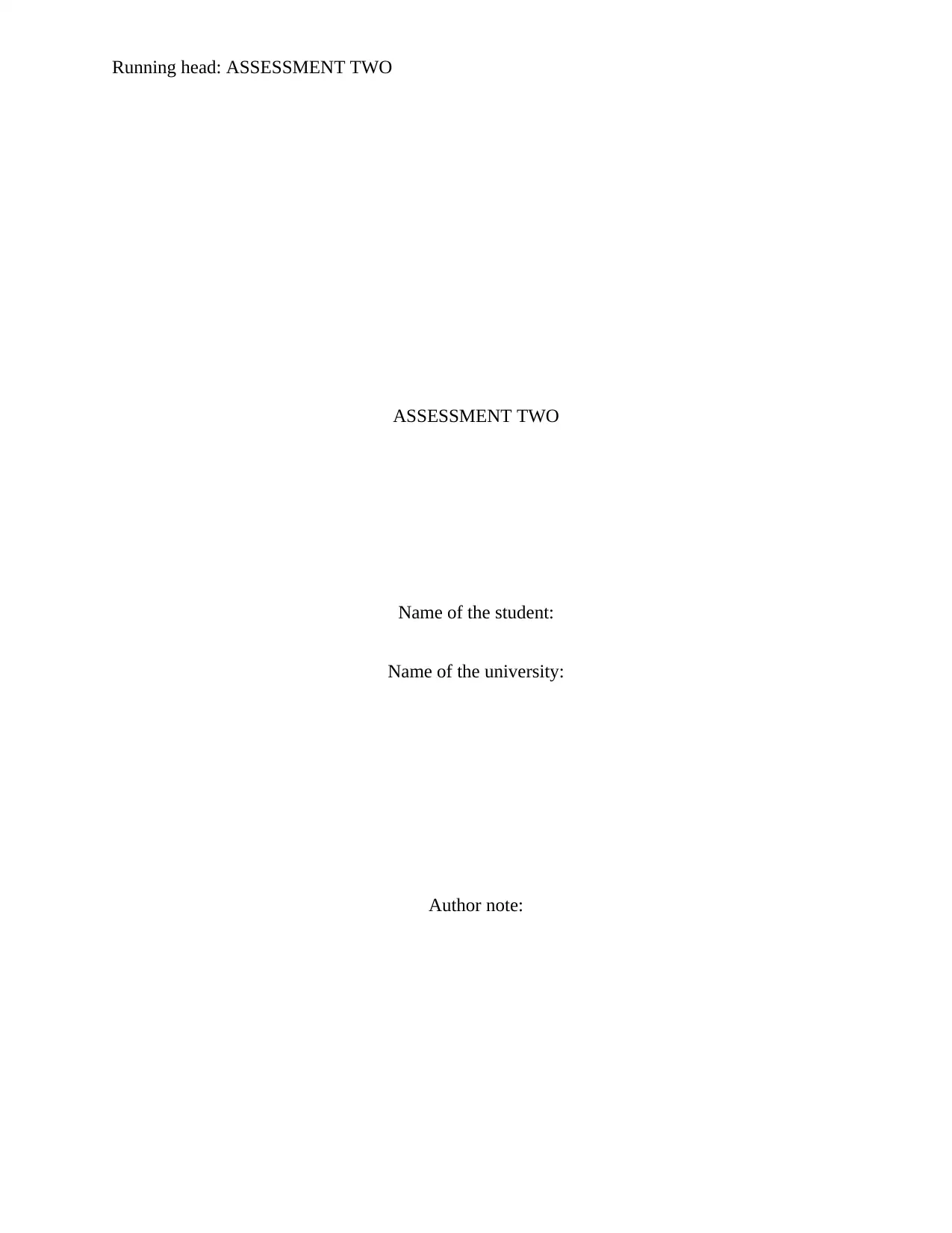
Running head: ASSESSMENT TWO
ASSESSMENT TWO
Name of the student:
Name of the university:
Author note:
ASSESSMENT TWO
Name of the student:
Name of the university:
Author note:
Paraphrase This Document
Need a fresh take? Get an instant paraphrase of this document with our AI Paraphraser
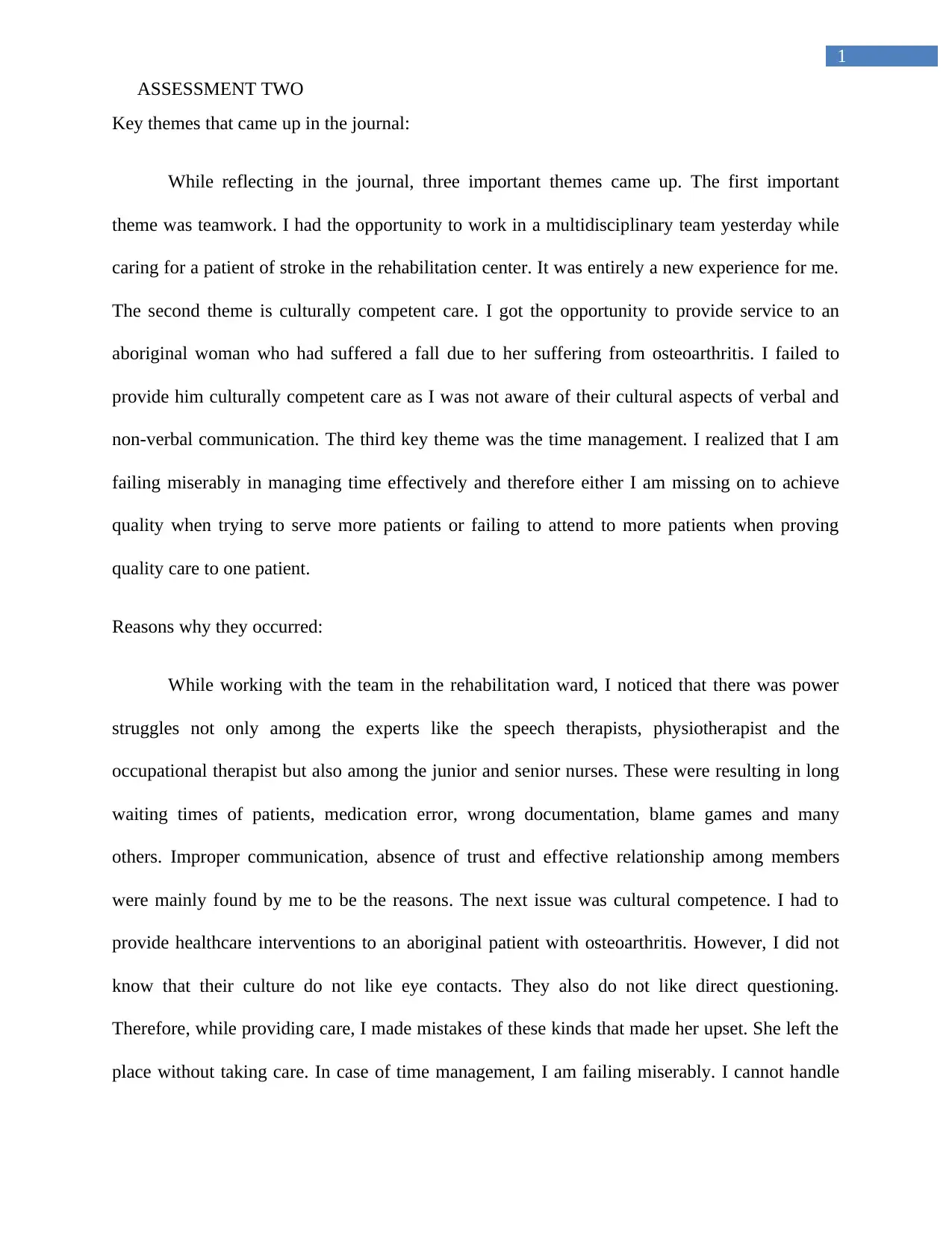
1
ASSESSMENT TWO
Key themes that came up in the journal:
While reflecting in the journal, three important themes came up. The first important
theme was teamwork. I had the opportunity to work in a multidisciplinary team yesterday while
caring for a patient of stroke in the rehabilitation center. It was entirely a new experience for me.
The second theme is culturally competent care. I got the opportunity to provide service to an
aboriginal woman who had suffered a fall due to her suffering from osteoarthritis. I failed to
provide him culturally competent care as I was not aware of their cultural aspects of verbal and
non-verbal communication. The third key theme was the time management. I realized that I am
failing miserably in managing time effectively and therefore either I am missing on to achieve
quality when trying to serve more patients or failing to attend to more patients when proving
quality care to one patient.
Reasons why they occurred:
While working with the team in the rehabilitation ward, I noticed that there was power
struggles not only among the experts like the speech therapists, physiotherapist and the
occupational therapist but also among the junior and senior nurses. These were resulting in long
waiting times of patients, medication error, wrong documentation, blame games and many
others. Improper communication, absence of trust and effective relationship among members
were mainly found by me to be the reasons. The next issue was cultural competence. I had to
provide healthcare interventions to an aboriginal patient with osteoarthritis. However, I did not
know that their culture do not like eye contacts. They also do not like direct questioning.
Therefore, while providing care, I made mistakes of these kinds that made her upset. She left the
place without taking care. In case of time management, I am failing miserably. I cannot handle
ASSESSMENT TWO
Key themes that came up in the journal:
While reflecting in the journal, three important themes came up. The first important
theme was teamwork. I had the opportunity to work in a multidisciplinary team yesterday while
caring for a patient of stroke in the rehabilitation center. It was entirely a new experience for me.
The second theme is culturally competent care. I got the opportunity to provide service to an
aboriginal woman who had suffered a fall due to her suffering from osteoarthritis. I failed to
provide him culturally competent care as I was not aware of their cultural aspects of verbal and
non-verbal communication. The third key theme was the time management. I realized that I am
failing miserably in managing time effectively and therefore either I am missing on to achieve
quality when trying to serve more patients or failing to attend to more patients when proving
quality care to one patient.
Reasons why they occurred:
While working with the team in the rehabilitation ward, I noticed that there was power
struggles not only among the experts like the speech therapists, physiotherapist and the
occupational therapist but also among the junior and senior nurses. These were resulting in long
waiting times of patients, medication error, wrong documentation, blame games and many
others. Improper communication, absence of trust and effective relationship among members
were mainly found by me to be the reasons. The next issue was cultural competence. I had to
provide healthcare interventions to an aboriginal patient with osteoarthritis. However, I did not
know that their culture do not like eye contacts. They also do not like direct questioning.
Therefore, while providing care, I made mistakes of these kinds that made her upset. She left the
place without taking care. In case of time management, I am failing miserably. I cannot handle
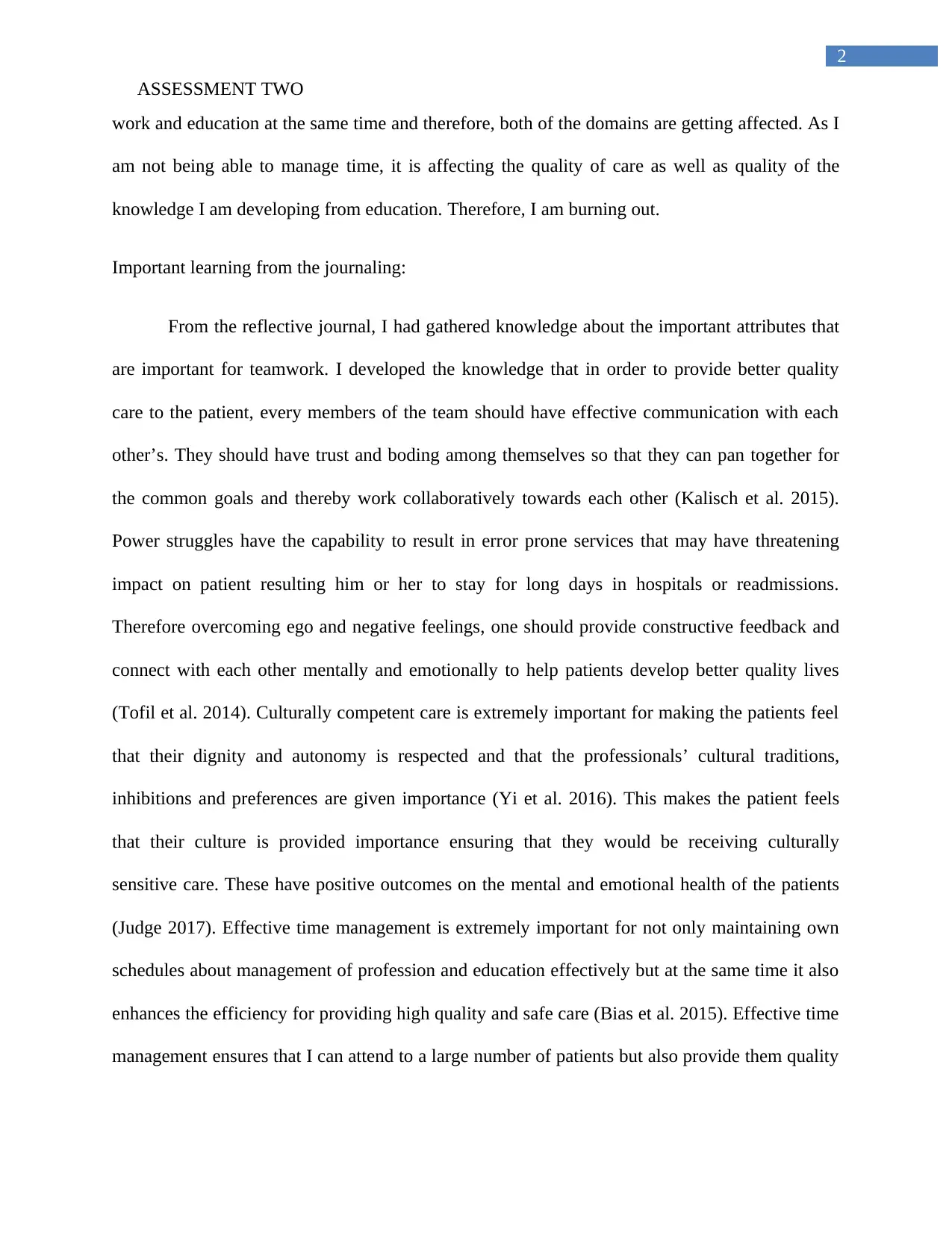
2
ASSESSMENT TWO
work and education at the same time and therefore, both of the domains are getting affected. As I
am not being able to manage time, it is affecting the quality of care as well as quality of the
knowledge I am developing from education. Therefore, I am burning out.
Important learning from the journaling:
From the reflective journal, I had gathered knowledge about the important attributes that
are important for teamwork. I developed the knowledge that in order to provide better quality
care to the patient, every members of the team should have effective communication with each
other’s. They should have trust and boding among themselves so that they can pan together for
the common goals and thereby work collaboratively towards each other (Kalisch et al. 2015).
Power struggles have the capability to result in error prone services that may have threatening
impact on patient resulting him or her to stay for long days in hospitals or readmissions.
Therefore overcoming ego and negative feelings, one should provide constructive feedback and
connect with each other mentally and emotionally to help patients develop better quality lives
(Tofil et al. 2014). Culturally competent care is extremely important for making the patients feel
that their dignity and autonomy is respected and that the professionals’ cultural traditions,
inhibitions and preferences are given importance (Yi et al. 2016). This makes the patient feels
that their culture is provided importance ensuring that they would be receiving culturally
sensitive care. These have positive outcomes on the mental and emotional health of the patients
(Judge 2017). Effective time management is extremely important for not only maintaining own
schedules about management of profession and education effectively but at the same time it also
enhances the efficiency for providing high quality and safe care (Bias et al. 2015). Effective time
management ensures that I can attend to a large number of patients but also provide them quality
ASSESSMENT TWO
work and education at the same time and therefore, both of the domains are getting affected. As I
am not being able to manage time, it is affecting the quality of care as well as quality of the
knowledge I am developing from education. Therefore, I am burning out.
Important learning from the journaling:
From the reflective journal, I had gathered knowledge about the important attributes that
are important for teamwork. I developed the knowledge that in order to provide better quality
care to the patient, every members of the team should have effective communication with each
other’s. They should have trust and boding among themselves so that they can pan together for
the common goals and thereby work collaboratively towards each other (Kalisch et al. 2015).
Power struggles have the capability to result in error prone services that may have threatening
impact on patient resulting him or her to stay for long days in hospitals or readmissions.
Therefore overcoming ego and negative feelings, one should provide constructive feedback and
connect with each other mentally and emotionally to help patients develop better quality lives
(Tofil et al. 2014). Culturally competent care is extremely important for making the patients feel
that their dignity and autonomy is respected and that the professionals’ cultural traditions,
inhibitions and preferences are given importance (Yi et al. 2016). This makes the patient feels
that their culture is provided importance ensuring that they would be receiving culturally
sensitive care. These have positive outcomes on the mental and emotional health of the patients
(Judge 2017). Effective time management is extremely important for not only maintaining own
schedules about management of profession and education effectively but at the same time it also
enhances the efficiency for providing high quality and safe care (Bias et al. 2015). Effective time
management ensures that I can attend to a large number of patients but also provide them quality
⊘ This is a preview!⊘
Do you want full access?
Subscribe today to unlock all pages.

Trusted by 1+ million students worldwide
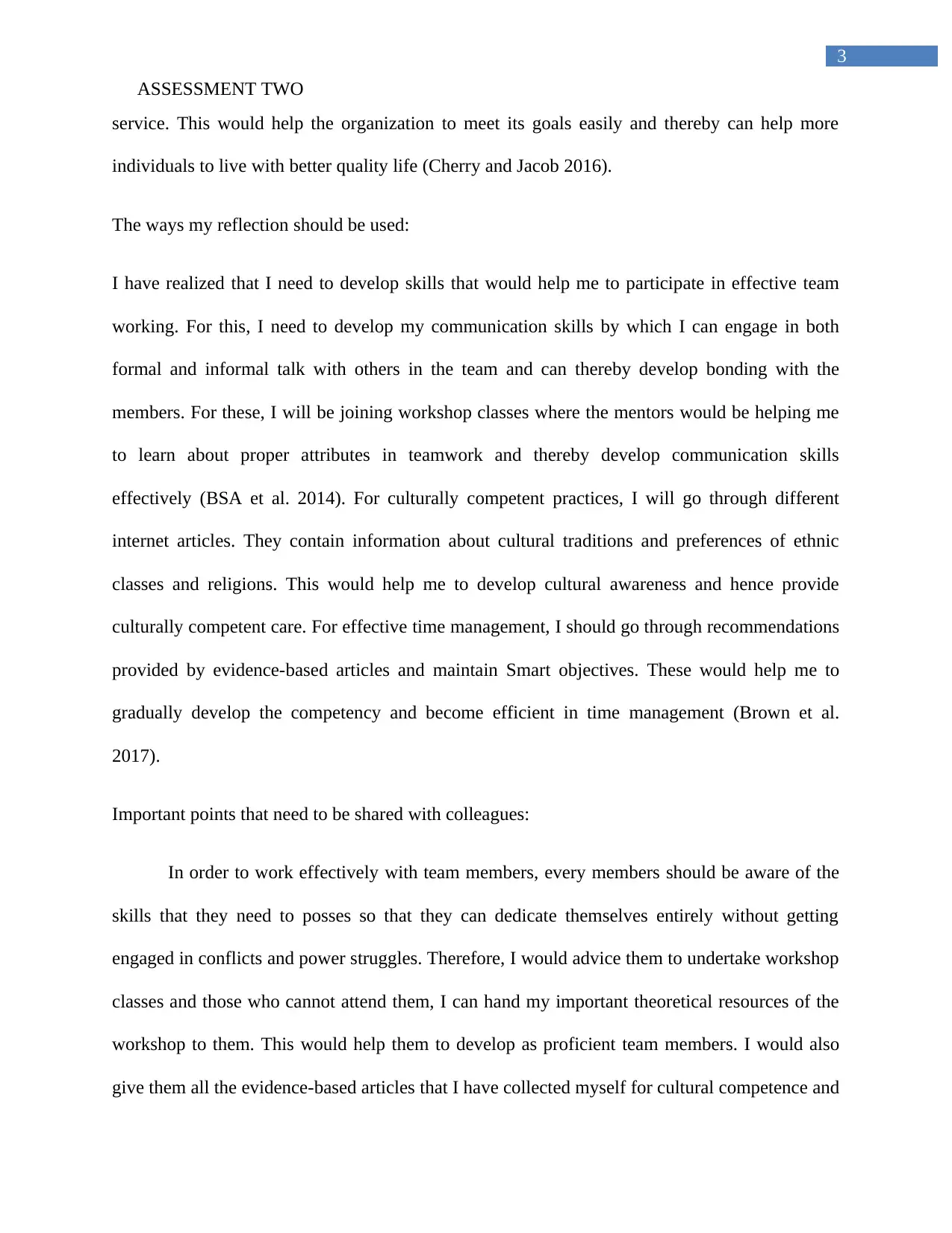
3
ASSESSMENT TWO
service. This would help the organization to meet its goals easily and thereby can help more
individuals to live with better quality life (Cherry and Jacob 2016).
The ways my reflection should be used:
I have realized that I need to develop skills that would help me to participate in effective team
working. For this, I need to develop my communication skills by which I can engage in both
formal and informal talk with others in the team and can thereby develop bonding with the
members. For these, I will be joining workshop classes where the mentors would be helping me
to learn about proper attributes in teamwork and thereby develop communication skills
effectively (BSA et al. 2014). For culturally competent practices, I will go through different
internet articles. They contain information about cultural traditions and preferences of ethnic
classes and religions. This would help me to develop cultural awareness and hence provide
culturally competent care. For effective time management, I should go through recommendations
provided by evidence-based articles and maintain Smart objectives. These would help me to
gradually develop the competency and become efficient in time management (Brown et al.
2017).
Important points that need to be shared with colleagues:
In order to work effectively with team members, every members should be aware of the
skills that they need to posses so that they can dedicate themselves entirely without getting
engaged in conflicts and power struggles. Therefore, I would advice them to undertake workshop
classes and those who cannot attend them, I can hand my important theoretical resources of the
workshop to them. This would help them to develop as proficient team members. I would also
give them all the evidence-based articles that I have collected myself for cultural competence and
ASSESSMENT TWO
service. This would help the organization to meet its goals easily and thereby can help more
individuals to live with better quality life (Cherry and Jacob 2016).
The ways my reflection should be used:
I have realized that I need to develop skills that would help me to participate in effective team
working. For this, I need to develop my communication skills by which I can engage in both
formal and informal talk with others in the team and can thereby develop bonding with the
members. For these, I will be joining workshop classes where the mentors would be helping me
to learn about proper attributes in teamwork and thereby develop communication skills
effectively (BSA et al. 2014). For culturally competent practices, I will go through different
internet articles. They contain information about cultural traditions and preferences of ethnic
classes and religions. This would help me to develop cultural awareness and hence provide
culturally competent care. For effective time management, I should go through recommendations
provided by evidence-based articles and maintain Smart objectives. These would help me to
gradually develop the competency and become efficient in time management (Brown et al.
2017).
Important points that need to be shared with colleagues:
In order to work effectively with team members, every members should be aware of the
skills that they need to posses so that they can dedicate themselves entirely without getting
engaged in conflicts and power struggles. Therefore, I would advice them to undertake workshop
classes and those who cannot attend them, I can hand my important theoretical resources of the
workshop to them. This would help them to develop as proficient team members. I would also
give them all the evidence-based articles that I have collected myself for cultural competence and
Paraphrase This Document
Need a fresh take? Get an instant paraphrase of this document with our AI Paraphraser
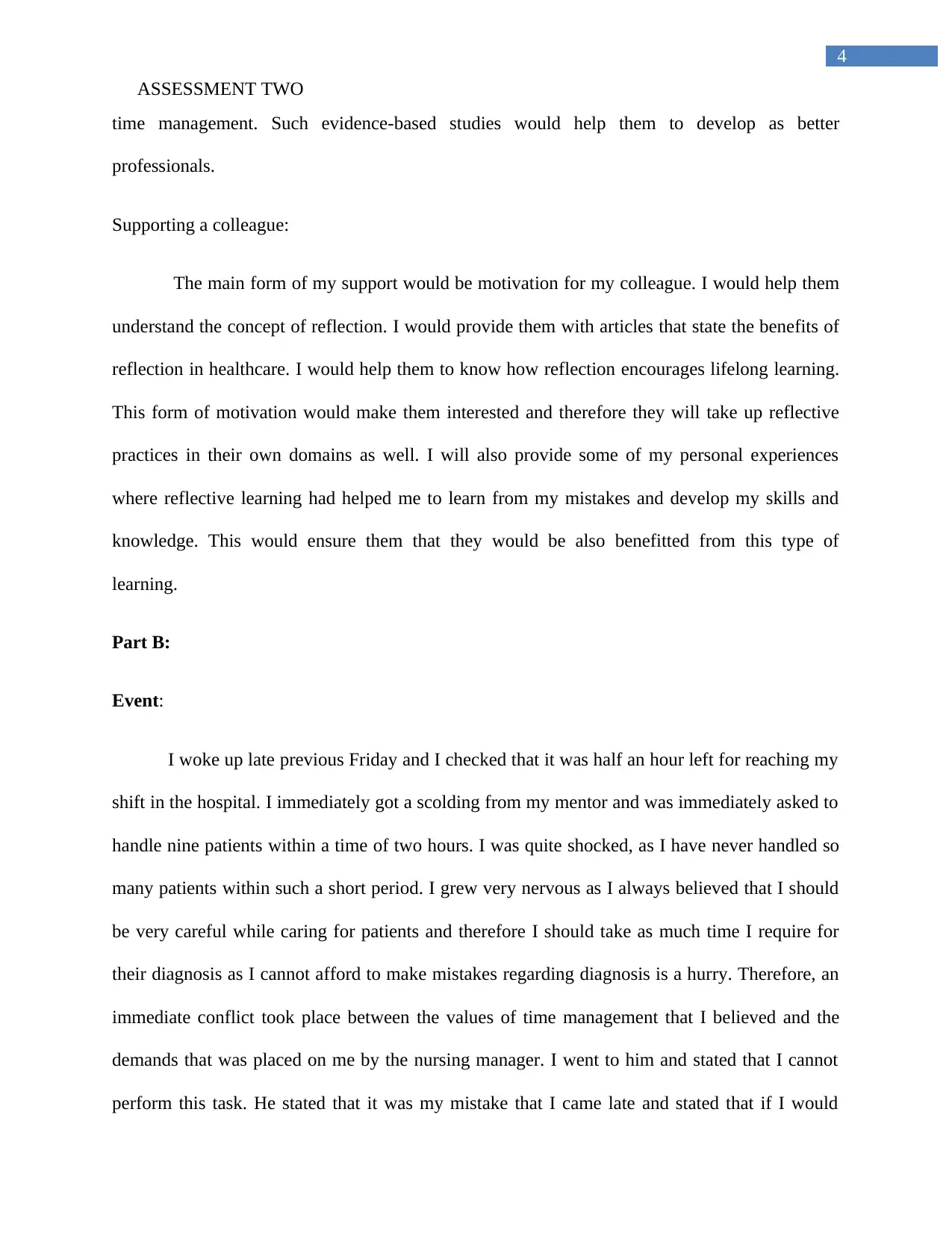
4
ASSESSMENT TWO
time management. Such evidence-based studies would help them to develop as better
professionals.
Supporting a colleague:
The main form of my support would be motivation for my colleague. I would help them
understand the concept of reflection. I would provide them with articles that state the benefits of
reflection in healthcare. I would help them to know how reflection encourages lifelong learning.
This form of motivation would make them interested and therefore they will take up reflective
practices in their own domains as well. I will also provide some of my personal experiences
where reflective learning had helped me to learn from my mistakes and develop my skills and
knowledge. This would ensure them that they would be also benefitted from this type of
learning.
Part B:
Event:
I woke up late previous Friday and I checked that it was half an hour left for reaching my
shift in the hospital. I immediately got a scolding from my mentor and was immediately asked to
handle nine patients within a time of two hours. I was quite shocked, as I have never handled so
many patients within such a short period. I grew very nervous as I always believed that I should
be very careful while caring for patients and therefore I should take as much time I require for
their diagnosis as I cannot afford to make mistakes regarding diagnosis is a hurry. Therefore, an
immediate conflict took place between the values of time management that I believed and the
demands that was placed on me by the nursing manager. I went to him and stated that I cannot
perform this task. He stated that it was my mistake that I came late and stated that if I would
ASSESSMENT TWO
time management. Such evidence-based studies would help them to develop as better
professionals.
Supporting a colleague:
The main form of my support would be motivation for my colleague. I would help them
understand the concept of reflection. I would provide them with articles that state the benefits of
reflection in healthcare. I would help them to know how reflection encourages lifelong learning.
This form of motivation would make them interested and therefore they will take up reflective
practices in their own domains as well. I will also provide some of my personal experiences
where reflective learning had helped me to learn from my mistakes and develop my skills and
knowledge. This would ensure them that they would be also benefitted from this type of
learning.
Part B:
Event:
I woke up late previous Friday and I checked that it was half an hour left for reaching my
shift in the hospital. I immediately got a scolding from my mentor and was immediately asked to
handle nine patients within a time of two hours. I was quite shocked, as I have never handled so
many patients within such a short period. I grew very nervous as I always believed that I should
be very careful while caring for patients and therefore I should take as much time I require for
their diagnosis as I cannot afford to make mistakes regarding diagnosis is a hurry. Therefore, an
immediate conflict took place between the values of time management that I believed and the
demands that was placed on me by the nursing manager. I went to him and stated that I cannot
perform this task. He stated that it was my mistake that I came late and stated that if I would
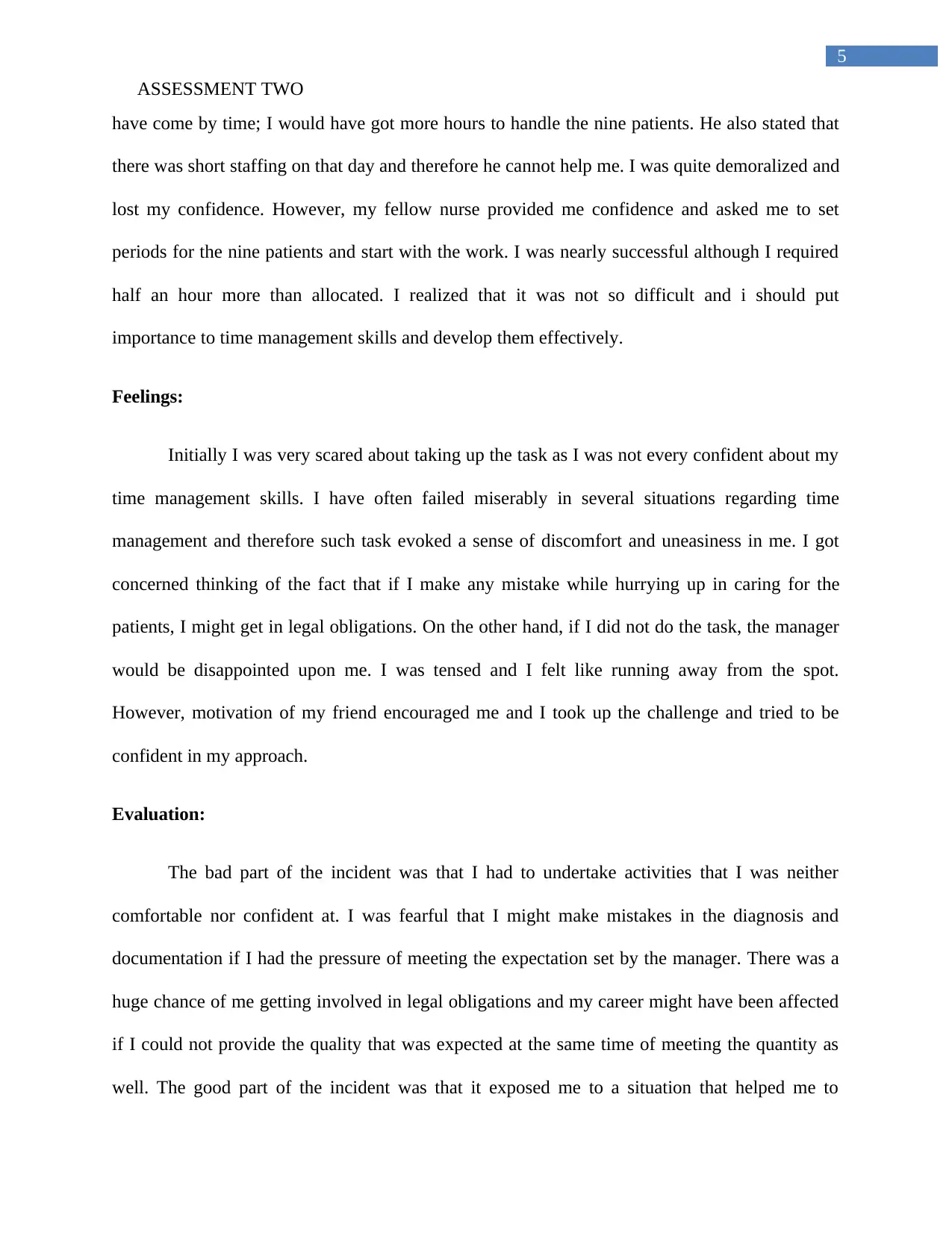
5
ASSESSMENT TWO
have come by time; I would have got more hours to handle the nine patients. He also stated that
there was short staffing on that day and therefore he cannot help me. I was quite demoralized and
lost my confidence. However, my fellow nurse provided me confidence and asked me to set
periods for the nine patients and start with the work. I was nearly successful although I required
half an hour more than allocated. I realized that it was not so difficult and i should put
importance to time management skills and develop them effectively.
Feelings:
Initially I was very scared about taking up the task as I was not every confident about my
time management skills. I have often failed miserably in several situations regarding time
management and therefore such task evoked a sense of discomfort and uneasiness in me. I got
concerned thinking of the fact that if I make any mistake while hurrying up in caring for the
patients, I might get in legal obligations. On the other hand, if I did not do the task, the manager
would be disappointed upon me. I was tensed and I felt like running away from the spot.
However, motivation of my friend encouraged me and I took up the challenge and tried to be
confident in my approach.
Evaluation:
The bad part of the incident was that I had to undertake activities that I was neither
comfortable nor confident at. I was fearful that I might make mistakes in the diagnosis and
documentation if I had the pressure of meeting the expectation set by the manager. There was a
huge chance of me getting involved in legal obligations and my career might have been affected
if I could not provide the quality that was expected at the same time of meeting the quantity as
well. The good part of the incident was that it exposed me to a situation that helped me to
ASSESSMENT TWO
have come by time; I would have got more hours to handle the nine patients. He also stated that
there was short staffing on that day and therefore he cannot help me. I was quite demoralized and
lost my confidence. However, my fellow nurse provided me confidence and asked me to set
periods for the nine patients and start with the work. I was nearly successful although I required
half an hour more than allocated. I realized that it was not so difficult and i should put
importance to time management skills and develop them effectively.
Feelings:
Initially I was very scared about taking up the task as I was not every confident about my
time management skills. I have often failed miserably in several situations regarding time
management and therefore such task evoked a sense of discomfort and uneasiness in me. I got
concerned thinking of the fact that if I make any mistake while hurrying up in caring for the
patients, I might get in legal obligations. On the other hand, if I did not do the task, the manager
would be disappointed upon me. I was tensed and I felt like running away from the spot.
However, motivation of my friend encouraged me and I took up the challenge and tried to be
confident in my approach.
Evaluation:
The bad part of the incident was that I had to undertake activities that I was neither
comfortable nor confident at. I was fearful that I might make mistakes in the diagnosis and
documentation if I had the pressure of meeting the expectation set by the manager. There was a
huge chance of me getting involved in legal obligations and my career might have been affected
if I could not provide the quality that was expected at the same time of meeting the quantity as
well. The good part of the incident was that it exposed me to a situation that helped me to
⊘ This is a preview!⊘
Do you want full access?
Subscribe today to unlock all pages.

Trusted by 1+ million students worldwide
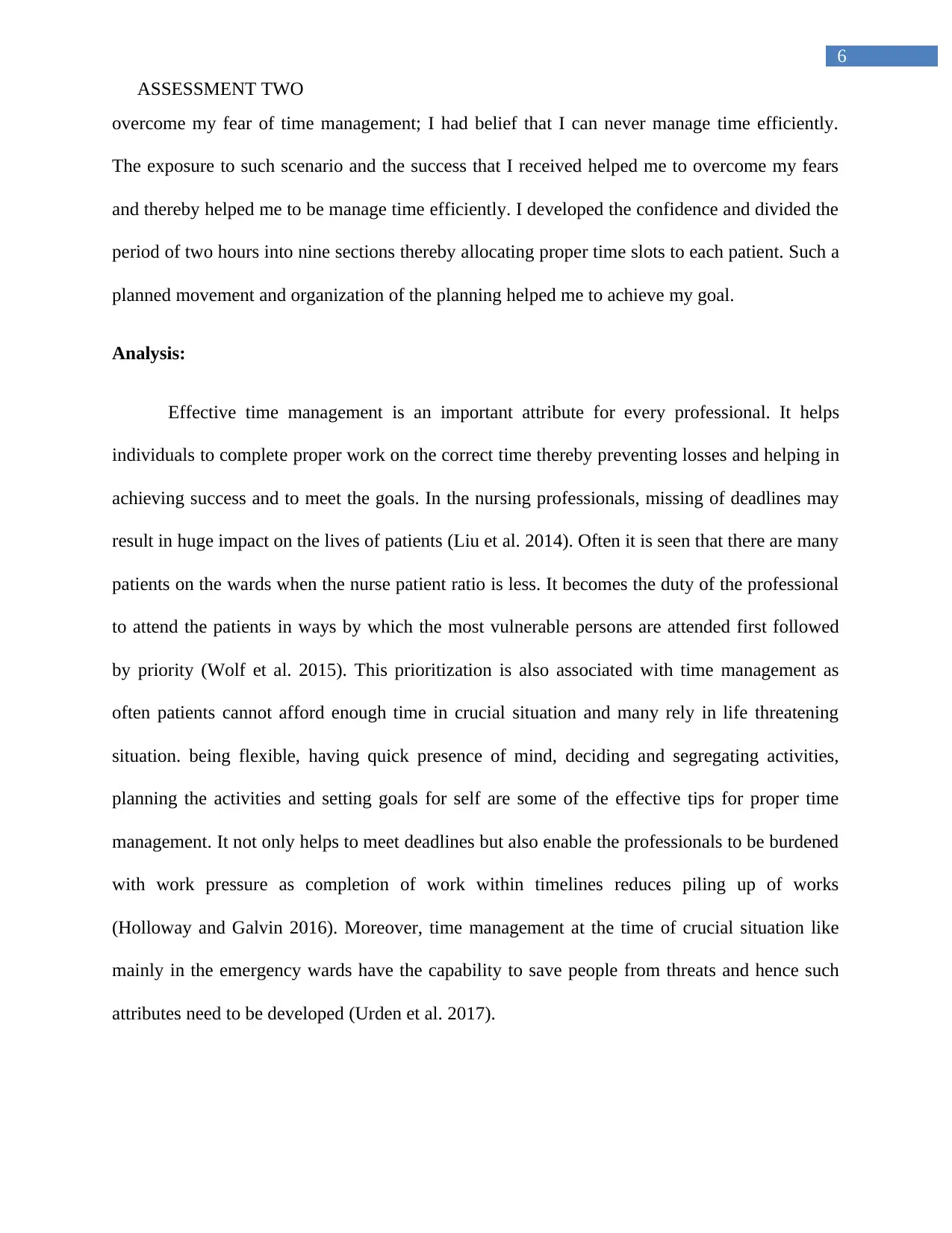
6
ASSESSMENT TWO
overcome my fear of time management; I had belief that I can never manage time efficiently.
The exposure to such scenario and the success that I received helped me to overcome my fears
and thereby helped me to be manage time efficiently. I developed the confidence and divided the
period of two hours into nine sections thereby allocating proper time slots to each patient. Such a
planned movement and organization of the planning helped me to achieve my goal.
Analysis:
Effective time management is an important attribute for every professional. It helps
individuals to complete proper work on the correct time thereby preventing losses and helping in
achieving success and to meet the goals. In the nursing professionals, missing of deadlines may
result in huge impact on the lives of patients (Liu et al. 2014). Often it is seen that there are many
patients on the wards when the nurse patient ratio is less. It becomes the duty of the professional
to attend the patients in ways by which the most vulnerable persons are attended first followed
by priority (Wolf et al. 2015). This prioritization is also associated with time management as
often patients cannot afford enough time in crucial situation and many rely in life threatening
situation. being flexible, having quick presence of mind, deciding and segregating activities,
planning the activities and setting goals for self are some of the effective tips for proper time
management. It not only helps to meet deadlines but also enable the professionals to be burdened
with work pressure as completion of work within timelines reduces piling up of works
(Holloway and Galvin 2016). Moreover, time management at the time of crucial situation like
mainly in the emergency wards have the capability to save people from threats and hence such
attributes need to be developed (Urden et al. 2017).
ASSESSMENT TWO
overcome my fear of time management; I had belief that I can never manage time efficiently.
The exposure to such scenario and the success that I received helped me to overcome my fears
and thereby helped me to be manage time efficiently. I developed the confidence and divided the
period of two hours into nine sections thereby allocating proper time slots to each patient. Such a
planned movement and organization of the planning helped me to achieve my goal.
Analysis:
Effective time management is an important attribute for every professional. It helps
individuals to complete proper work on the correct time thereby preventing losses and helping in
achieving success and to meet the goals. In the nursing professionals, missing of deadlines may
result in huge impact on the lives of patients (Liu et al. 2014). Often it is seen that there are many
patients on the wards when the nurse patient ratio is less. It becomes the duty of the professional
to attend the patients in ways by which the most vulnerable persons are attended first followed
by priority (Wolf et al. 2015). This prioritization is also associated with time management as
often patients cannot afford enough time in crucial situation and many rely in life threatening
situation. being flexible, having quick presence of mind, deciding and segregating activities,
planning the activities and setting goals for self are some of the effective tips for proper time
management. It not only helps to meet deadlines but also enable the professionals to be burdened
with work pressure as completion of work within timelines reduces piling up of works
(Holloway and Galvin 2016). Moreover, time management at the time of crucial situation like
mainly in the emergency wards have the capability to save people from threats and hence such
attributes need to be developed (Urden et al. 2017).
Paraphrase This Document
Need a fresh take? Get an instant paraphrase of this document with our AI Paraphraser
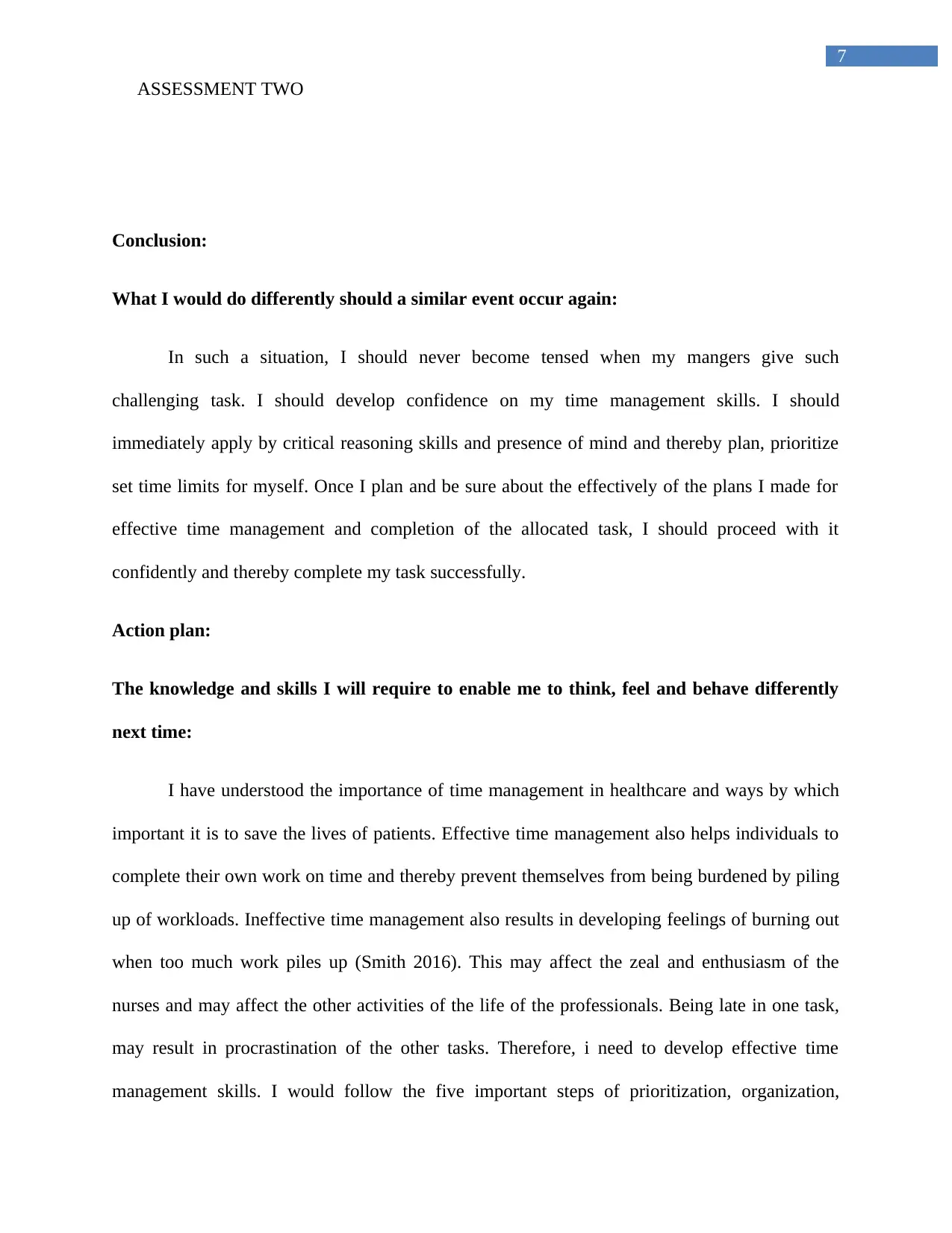
7
ASSESSMENT TWO
Conclusion:
What I would do differently should a similar event occur again:
In such a situation, I should never become tensed when my mangers give such
challenging task. I should develop confidence on my time management skills. I should
immediately apply by critical reasoning skills and presence of mind and thereby plan, prioritize
set time limits for myself. Once I plan and be sure about the effectively of the plans I made for
effective time management and completion of the allocated task, I should proceed with it
confidently and thereby complete my task successfully.
Action plan:
The knowledge and skills I will require to enable me to think, feel and behave differently
next time:
I have understood the importance of time management in healthcare and ways by which
important it is to save the lives of patients. Effective time management also helps individuals to
complete their own work on time and thereby prevent themselves from being burdened by piling
up of workloads. Ineffective time management also results in developing feelings of burning out
when too much work piles up (Smith 2016). This may affect the zeal and enthusiasm of the
nurses and may affect the other activities of the life of the professionals. Being late in one task,
may result in procrastination of the other tasks. Therefore, i need to develop effective time
management skills. I would follow the five important steps of prioritization, organization,
ASSESSMENT TWO
Conclusion:
What I would do differently should a similar event occur again:
In such a situation, I should never become tensed when my mangers give such
challenging task. I should develop confidence on my time management skills. I should
immediately apply by critical reasoning skills and presence of mind and thereby plan, prioritize
set time limits for myself. Once I plan and be sure about the effectively of the plans I made for
effective time management and completion of the allocated task, I should proceed with it
confidently and thereby complete my task successfully.
Action plan:
The knowledge and skills I will require to enable me to think, feel and behave differently
next time:
I have understood the importance of time management in healthcare and ways by which
important it is to save the lives of patients. Effective time management also helps individuals to
complete their own work on time and thereby prevent themselves from being burdened by piling
up of workloads. Ineffective time management also results in developing feelings of burning out
when too much work piles up (Smith 2016). This may affect the zeal and enthusiasm of the
nurses and may affect the other activities of the life of the professionals. Being late in one task,
may result in procrastination of the other tasks. Therefore, i need to develop effective time
management skills. I would follow the five important steps of prioritization, organization,
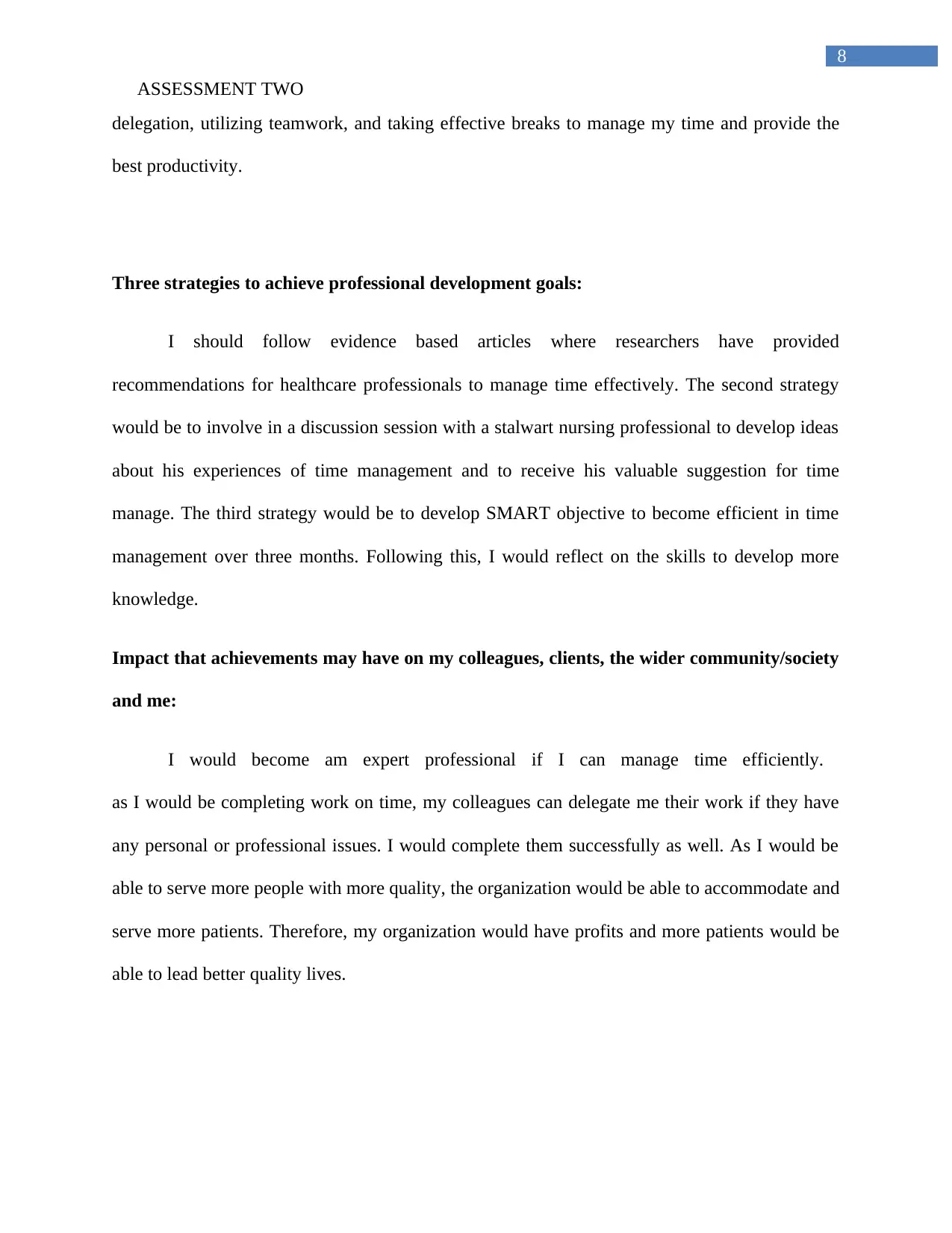
8
ASSESSMENT TWO
delegation, utilizing teamwork, and taking effective breaks to manage my time and provide the
best productivity.
Three strategies to achieve professional development goals:
I should follow evidence based articles where researchers have provided
recommendations for healthcare professionals to manage time effectively. The second strategy
would be to involve in a discussion session with a stalwart nursing professional to develop ideas
about his experiences of time management and to receive his valuable suggestion for time
manage. The third strategy would be to develop SMART objective to become efficient in time
management over three months. Following this, I would reflect on the skills to develop more
knowledge.
Impact that achievements may have on my colleagues, clients, the wider community/society
and me:
I would become am expert professional if I can manage time efficiently.
as I would be completing work on time, my colleagues can delegate me their work if they have
any personal or professional issues. I would complete them successfully as well. As I would be
able to serve more people with more quality, the organization would be able to accommodate and
serve more patients. Therefore, my organization would have profits and more patients would be
able to lead better quality lives.
ASSESSMENT TWO
delegation, utilizing teamwork, and taking effective breaks to manage my time and provide the
best productivity.
Three strategies to achieve professional development goals:
I should follow evidence based articles where researchers have provided
recommendations for healthcare professionals to manage time effectively. The second strategy
would be to involve in a discussion session with a stalwart nursing professional to develop ideas
about his experiences of time management and to receive his valuable suggestion for time
manage. The third strategy would be to develop SMART objective to become efficient in time
management over three months. Following this, I would reflect on the skills to develop more
knowledge.
Impact that achievements may have on my colleagues, clients, the wider community/society
and me:
I would become am expert professional if I can manage time efficiently.
as I would be completing work on time, my colleagues can delegate me their work if they have
any personal or professional issues. I would complete them successfully as well. As I would be
able to serve more people with more quality, the organization would be able to accommodate and
serve more patients. Therefore, my organization would have profits and more patients would be
able to lead better quality lives.
⊘ This is a preview!⊘
Do you want full access?
Subscribe today to unlock all pages.

Trusted by 1+ million students worldwide
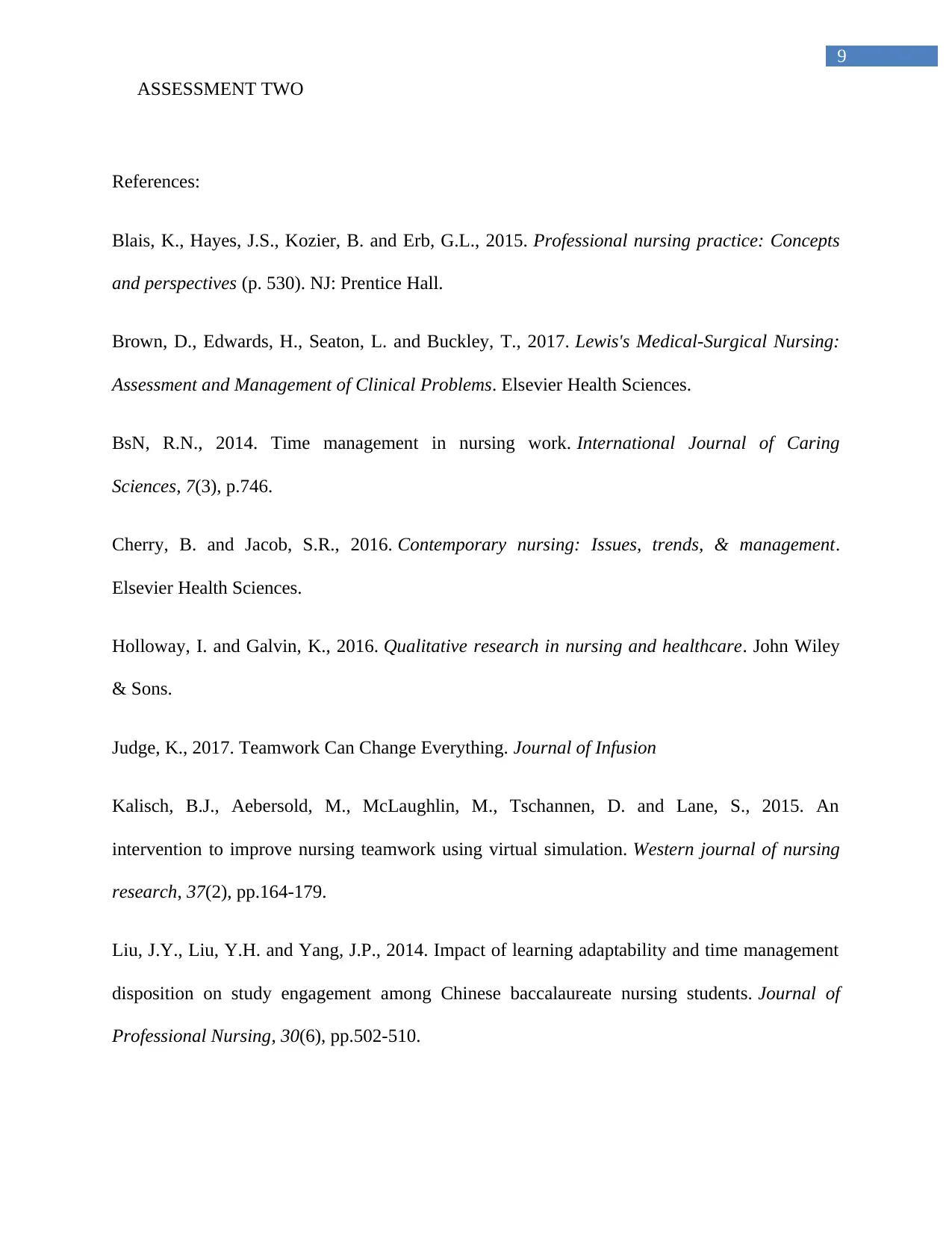
9
ASSESSMENT TWO
References:
Blais, K., Hayes, J.S., Kozier, B. and Erb, G.L., 2015. Professional nursing practice: Concepts
and perspectives (p. 530). NJ: Prentice Hall.
Brown, D., Edwards, H., Seaton, L. and Buckley, T., 2017. Lewis's Medical-Surgical Nursing:
Assessment and Management of Clinical Problems. Elsevier Health Sciences.
BsN, R.N., 2014. Time management in nursing work. International Journal of Caring
Sciences, 7(3), p.746.
Cherry, B. and Jacob, S.R., 2016. Contemporary nursing: Issues, trends, & management.
Elsevier Health Sciences.
Holloway, I. and Galvin, K., 2016. Qualitative research in nursing and healthcare. John Wiley
& Sons.
Judge, K., 2017. Teamwork Can Change Everything. Journal of Infusion
Kalisch, B.J., Aebersold, M., McLaughlin, M., Tschannen, D. and Lane, S., 2015. An
intervention to improve nursing teamwork using virtual simulation. Western journal of nursing
research, 37(2), pp.164-179.
Liu, J.Y., Liu, Y.H. and Yang, J.P., 2014. Impact of learning adaptability and time management
disposition on study engagement among Chinese baccalaureate nursing students. Journal of
Professional Nursing, 30(6), pp.502-510.
ASSESSMENT TWO
References:
Blais, K., Hayes, J.S., Kozier, B. and Erb, G.L., 2015. Professional nursing practice: Concepts
and perspectives (p. 530). NJ: Prentice Hall.
Brown, D., Edwards, H., Seaton, L. and Buckley, T., 2017. Lewis's Medical-Surgical Nursing:
Assessment and Management of Clinical Problems. Elsevier Health Sciences.
BsN, R.N., 2014. Time management in nursing work. International Journal of Caring
Sciences, 7(3), p.746.
Cherry, B. and Jacob, S.R., 2016. Contemporary nursing: Issues, trends, & management.
Elsevier Health Sciences.
Holloway, I. and Galvin, K., 2016. Qualitative research in nursing and healthcare. John Wiley
& Sons.
Judge, K., 2017. Teamwork Can Change Everything. Journal of Infusion
Kalisch, B.J., Aebersold, M., McLaughlin, M., Tschannen, D. and Lane, S., 2015. An
intervention to improve nursing teamwork using virtual simulation. Western journal of nursing
research, 37(2), pp.164-179.
Liu, J.Y., Liu, Y.H. and Yang, J.P., 2014. Impact of learning adaptability and time management
disposition on study engagement among Chinese baccalaureate nursing students. Journal of
Professional Nursing, 30(6), pp.502-510.
Paraphrase This Document
Need a fresh take? Get an instant paraphrase of this document with our AI Paraphraser
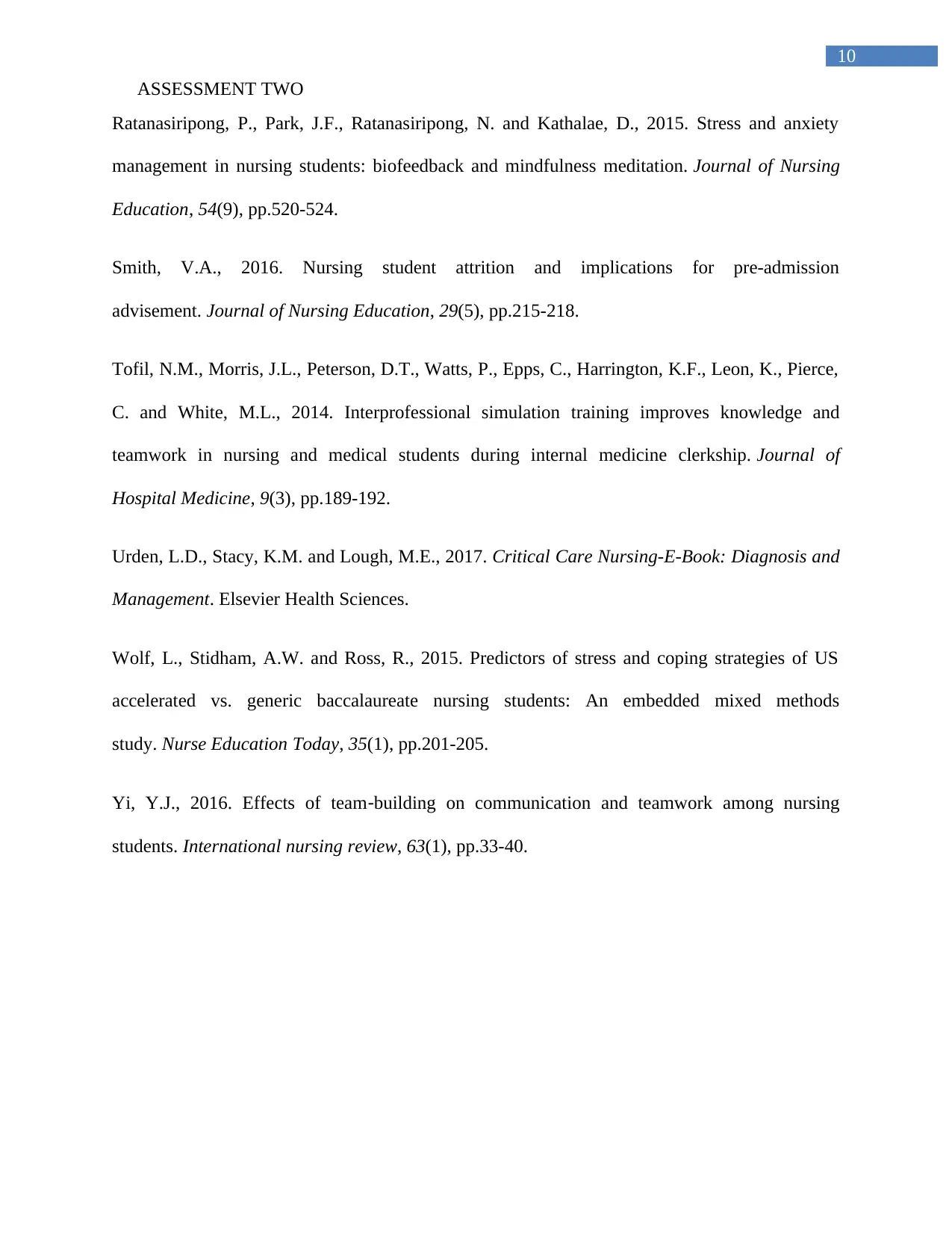
10
ASSESSMENT TWO
Ratanasiripong, P., Park, J.F., Ratanasiripong, N. and Kathalae, D., 2015. Stress and anxiety
management in nursing students: biofeedback and mindfulness meditation. Journal of Nursing
Education, 54(9), pp.520-524.
Smith, V.A., 2016. Nursing student attrition and implications for pre-admission
advisement. Journal of Nursing Education, 29(5), pp.215-218.
Tofil, N.M., Morris, J.L., Peterson, D.T., Watts, P., Epps, C., Harrington, K.F., Leon, K., Pierce,
C. and White, M.L., 2014. Interprofessional simulation training improves knowledge and
teamwork in nursing and medical students during internal medicine clerkship. Journal of
Hospital Medicine, 9(3), pp.189-192.
Urden, L.D., Stacy, K.M. and Lough, M.E., 2017. Critical Care Nursing-E-Book: Diagnosis and
Management. Elsevier Health Sciences.
Wolf, L., Stidham, A.W. and Ross, R., 2015. Predictors of stress and coping strategies of US
accelerated vs. generic baccalaureate nursing students: An embedded mixed methods
study. Nurse Education Today, 35(1), pp.201-205.
Yi, Y.J., 2016. Effects of team‐building on communication and teamwork among nursing
students. International nursing review, 63(1), pp.33-40.
ASSESSMENT TWO
Ratanasiripong, P., Park, J.F., Ratanasiripong, N. and Kathalae, D., 2015. Stress and anxiety
management in nursing students: biofeedback and mindfulness meditation. Journal of Nursing
Education, 54(9), pp.520-524.
Smith, V.A., 2016. Nursing student attrition and implications for pre-admission
advisement. Journal of Nursing Education, 29(5), pp.215-218.
Tofil, N.M., Morris, J.L., Peterson, D.T., Watts, P., Epps, C., Harrington, K.F., Leon, K., Pierce,
C. and White, M.L., 2014. Interprofessional simulation training improves knowledge and
teamwork in nursing and medical students during internal medicine clerkship. Journal of
Hospital Medicine, 9(3), pp.189-192.
Urden, L.D., Stacy, K.M. and Lough, M.E., 2017. Critical Care Nursing-E-Book: Diagnosis and
Management. Elsevier Health Sciences.
Wolf, L., Stidham, A.W. and Ross, R., 2015. Predictors of stress and coping strategies of US
accelerated vs. generic baccalaureate nursing students: An embedded mixed methods
study. Nurse Education Today, 35(1), pp.201-205.
Yi, Y.J., 2016. Effects of team‐building on communication and teamwork among nursing
students. International nursing review, 63(1), pp.33-40.
1 out of 11
Related Documents
Your All-in-One AI-Powered Toolkit for Academic Success.
+13062052269
info@desklib.com
Available 24*7 on WhatsApp / Email
![[object Object]](/_next/static/media/star-bottom.7253800d.svg)
Unlock your academic potential
Copyright © 2020–2026 A2Z Services. All Rights Reserved. Developed and managed by ZUCOL.





